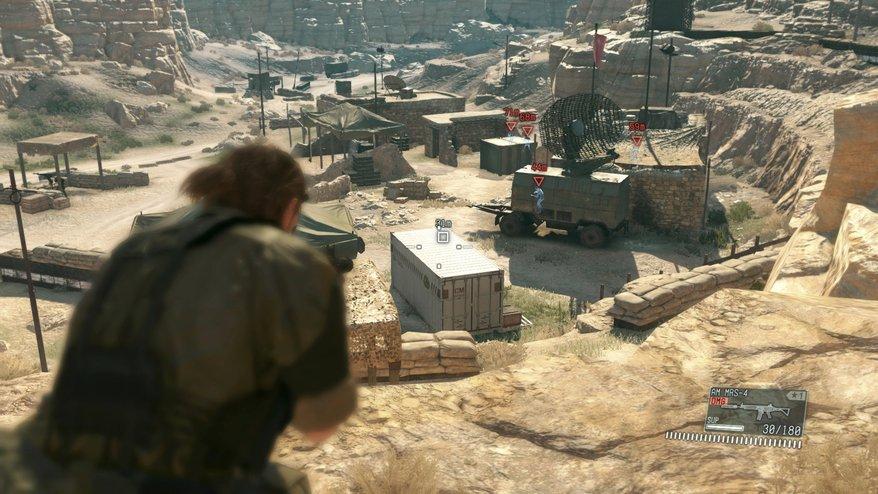“Metal Gear Solid V: The Phantom Pain” Review
“Metal Gear Solid V: The Phantom Pain” is the final installment in the “Metal Gear Solid” series. The story follows a famous soldier known as “Big Boss,” who runs an army of mercenaries that operate as their own miniature nation. During a mission, Big Boss is attacked by a powerful and mysterious group, and falls into a coma. He wakes up nine years later, in the year 1984, to a world where he has been forgotten, his army has been disbanded, and the group that attacked him is stronger than ever. Big Boss must assemble an army to fight the group, and take down a conspiracy that threatens the entire world.
The story starts out with an intense prologue that instantly hooks the player in, and the first half of the story is interesting, with an opening set of missions that follows Big Boss as he builds his army back up, but the second half crashes and burns. The missions in the last half suddenly shift: it starts with a series of disjointed missions with no connection to the plot, and then the final mission comes out of nowhere with no buildup. Even worse, the “final mission” isn’t the actual ending of the game: the player has to go through repeats of main missions and boss battles they’ve already played, the only changes being that more enemies have been added or the boss has been made more difficult, you must complete all of this to unlock the “true” ending of the game. It’s a ridiculous and confusing mess that throws the story out the window for a series of random challenges. It’s made clear from the beginning that the story is about Big Boss’s journey from a noble soldier to an extremist villain due to his desire for revenge and emotional damage from years of fighting in wars, but it utterly fails at accomplishing this, his transformation, the entire reason for the story to happen, is completely forgotten about and only brought up in literally the final seconds of the game.
There’s a large level of replayability with the main missions, as each one has various optional objectives, some of which aren’t possible to achieve until you gain new equipment in later missions. Rather than taking place in one-off levels, nearly all the missions take place in two open-world areas, Afghanistan and Angola. These areas are extremely large, with various items of interest and enemy encampments dotting the landscape, and add a lot of depth to the gameplay. There are side-missions in the game as well, they add a lot more hours of playtime, and are a source of resources and equipment. They’re quick, they’re fun, and they bring in a lot of rewards.
The biggest feature of “MGSV” is Mother Base, the base of operations for the player. Mother Base has several departments: the R&D Department that creates the equipment you use during missions, the Support Unit that brings in supplies and fire support when you’re in the field, the Intel Team that informs you of what you’ll encounter during missions, and the Combat Unit which goes on missions and brings back resources. The player staffs these departments by taking enemies captive, rescuing prisoners, and gaining volunteers based on their ranking during missions. Resources are collected during missions, which are used to upgrade the departments in order to gain more equipment and be prepared for missions. It’s a very interesting system, and the rate at which you unlock new equipment and gain more options in the field is just right, but it does have one issue: upgrading departments takes hours in real-time. It takes under an hour to create a department, but each upgrade done to a department takes anywhere from one hour to four hours and the time only passes while you’re playing the game, so in order to get a department upgraded, you would have to wait around in the game for four hours. It’s a frustrating design choice that wastes the player’s time.
There is multiplayer in the form of a game mode called “Forward Operating Base,” or “FOB” for short. Players create their own FOB, where their resources are stored and guarded by soldiers, and they can infiltrate other players’ bases, and other players can infiltrate their base. Once you acquire a FOB, anyone can raid it and steal your resources at any time, and the soldiers (as well as you, if you travel to the FOB during a raid) defend it until either the infiltrator is defeated or the resources are stolen. “FOB’ is an awful system, plain and simple. Even if the player has no desire to play multiplayer, they are forced to create a “FOB,” and their resources can be stolen even while the player is offline. The game forces you to go online and create a base just so other players can steal your hard-earned resources while you aren’t even playing the game.
The gameplay allows stealth and direct combat, but stealth is far more advantageous, as it avoids enemies being alerted and calling in reinforcements, allows enemy encampments to be taken out one enemy at a time rather than having to face them all at once, and is the only way to get the highest ranking on each mission. The sheer amount of options at your disposal is nearly overwhelming. In a first for the series, the difficulty adjusts dynamically, changing the tactics and equipment of enemies to stay as a formidable opponent to the player. If the player undertakes missions mainly during the night, enemies will gain flashlights and night vision goggles, or if the player relies on headshots to take out enemies, enemies will start wearing helmets. The dynamic difficulty is a great choice, it forces the player to change their tactics up, and makes each mission an actual challenge. The gameplay is excellent, and manages to stay fresh and enjoyable throughout the entire game.
Overall, “MGSV” has major issues: the story is an awful mess, nearly half the missions are exactly the same, and there are frustrating design choices with the Mother Base and “FOB” features. The gameplay is excellent, and it carries the entire game, but it can’t override all the failures of the game. “MGSV” is a disappointing finale to a great series.











